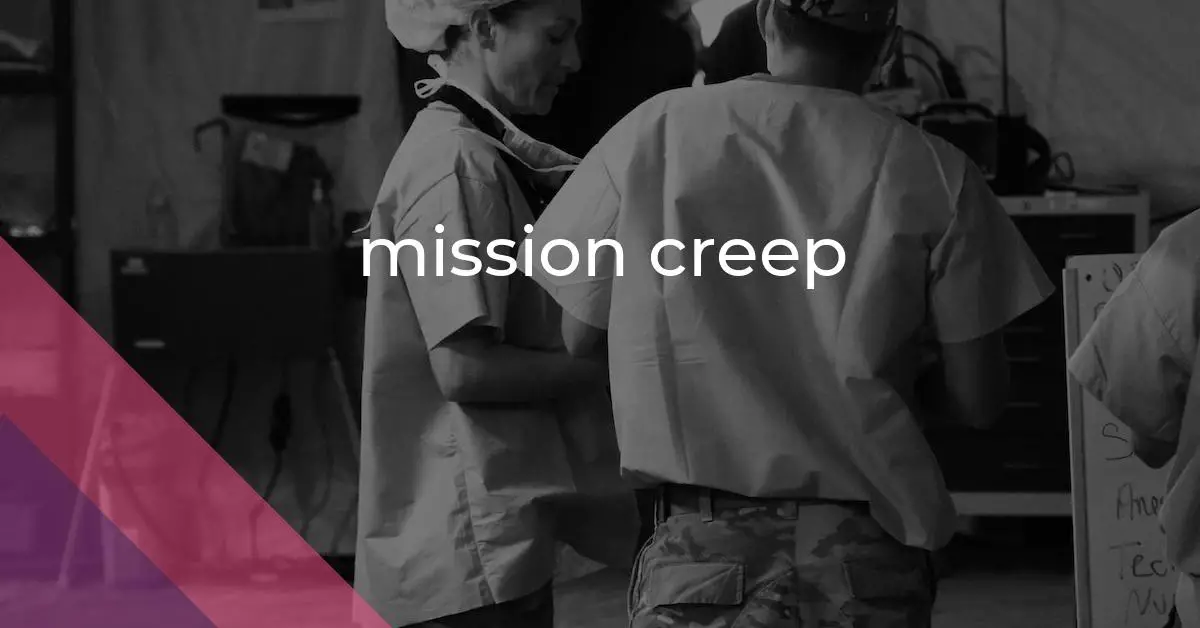mission creep: Idiom Meaning and Origin
What does ‘mission creep’ mean?
The idiom mission creep refers to the gradual expansion or widening of a mission's goals or objectives beyond its original scope, often resulting in unintended consequences or consequences not aligned with the initial purpose or plan.

Idiom Explorer
The idiom "slow march" refers to a situation or process that is progressing very slowly and deliberately, often lacking any sense of urgency or forward momentum.
An idiom that means to expand or increase the length or content of something, often by adding unnecessary or unimportant details.
The idiom "on the wane" means that something is declining or decreasing in strength, popularity, or influence. It describes a gradual and noticeable decline in a particular situation or condition.
The idiom "on the rise" refers to something or someone increasing in popularity, success, or influence. It suggests a positive upward trajectory or growth in a particular area or aspect.
The idiom "one step forward, two steps back" means to make progress in a certain situation, only to lose that progress and end up in a worse position than before. It refers to a setback or obstacle that hinders progress and is often used to express frustration or disappointment.
The idiom "one small step for man, one giant leap for mankind" expresses the idea that taking a seemingly insignificant action can have a monumental impact on society as a whole.
The idiom "one step at a time" means to proceed or approach a task slowly and methodically, focusing on each individual stage or action before moving on to the next.
The idiom "on course" means to be making progress and heading in the right direction towards a goal or objective.
The idiom "no plan survives contact with the enemy" means that in reality, plans often fail or need to be changed once they encounter real-life difficulties or challenges.
The idiom "miss the woods for the trees" means to become overly focused on small details and fail to see the bigger picture or main point of a situation.
Recursive Tangents
Mission creep is a widely understood and frequently used idiom in the United States. It describes a situation where an organization's initial purpose or goal gradually expands over time without proper planning or authorization.
The term "mission creep" first emerged in the military domain to describe the gradual expansion of a military operation beyond its original objectives. Its earliest recorded use dates back to the 1970s.
An example of mission creep in a military context is the United States' involvement in the Vietnam War. What began as a limited mission to support the South Vietnamese government in their fight against communism eventually escalated into a full-scale war with extensive deployment of troops and extensive military operations. This slow march towards an expanded mission resulted in unintended consequences and a loss of focus on the original objective.
In politics, mission creep occurs when government policies or programs expand beyond their initial scope. This can happen when new goals are added to the original mission, either intentionally or unintentionally. When politicians and policymakers pad out a program with extra objectives, it often leads to a dilution of resources and a failure to effectively address the original problem at hand.
Mission creep is not limited to the military or politics; it can also occur in the business world. Companies often find themselves deviating from their original business plans or core competencies due to market pressures, customer demands, or internal factors. This gradual shift in focus can cause businesses to lose ground and struggle to maintain a clear organizational identity.
Even on an individual level, mission creep can be observed. When individuals take on responsibilities or tasks that were not part of their initial role or job description, they risk losing focus, missing the mark on their primary objectives, and becoming overwhelmed. The desire to prove competence and a lack of delegation can contribute to this phenomenon.
It is worth noting that mission creep is not always negative. In some cases, expanding the scope can lead to positive outcomes and growth. However, if not managed effectively, mission creep can result in organizational inefficiency, lack of focus, and misallocation of resources. Organizations must be mindful of striking a balance between gradual expansion and maintaining clarity of purpose.
The idiomatic expression "mission creep" is commonly used in everyday conversations, media, and professional discussions. It has become a recognized shorthand for describing situations where the initial objectives of an operation or undertaking have gradually expanded in an unplanned or unintended manner. The term captures the essence of the phenomenon, emphasizing its gradual and subtle nature.
Like many idioms, the exact origins and journey of the term "mission creep" may never be fully known. Nevertheless, it has firmly established itself in the English language, and its usage will continue to evolve as new contexts and situations arise.
Example usage
Examples of how the idiom "mission creep" can be used in a sentence:
- The company started with a simple goal, but over time, they experienced mission creep and expanded into unrelated industries.
- The government's original plan for the new highway was to alleviate traffic congestion, but mission creep occurred, and they began adding additional features like bike lanes and pedestrian walkways.
- In the military, mission creep can be dangerous as it often leads to stretched resources and unclear objectives.
More "Military" idioms



